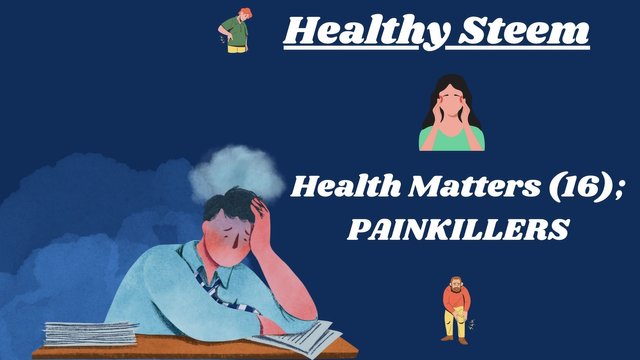Hello Steemit friends,
how are you all? I hope you are all well by the grace of Allah. I am also fine by the grace of Allah.Today, I will participate in the new contest from Healthy Steem brought by the honorable Moderator @sahmie. The name of the Contest is "Health Matters (16); PAINKILLERS" Thank you Healthy Steem for bringing this beautiful contest to us.

Image design by Canva
What are painkillers?
Many of us often experience various types of pain, including headaches, body aches, joint pain, knee pain, and spinal pain. To get rid of this pain, the medicines we take or the ointments we use to feel a little comfortable are called painkillers.
To put it more simply, painkillers are medicines that kill pain.
- By using painkillers, we feel comfortable for a temporary period.
- We use different types of painkillers for different types of pain. For example: -
- Acetaminophen, and ibuprofen for headaches, and body aches.
- We use various painkillers including morphine and oxycodone for severe pain
What do you think are the most common reasons people use painkillers?
Common people like us use painkillers at different times in the hope of getting relief from pain. For example: -
- We use painkillers in the hope of getting relief from headaches, toothache, muscle pain, back pain, and joint pain.
- Sometimes we take painkillers to get relief from the pain that originates after surgery.
- We take painkillers for chronic pain such as arthritis, fibromyalgia, and migraine pain.
- We use painkillers for severe pain in the body such as when a body part is broken or sprained.
- Painkillers are also taken during dysmenorrhea.
- Painkillers are also taken for pain due to cancer pain.
- Also, painkillers are taken for toothache and psychosomatic reasons.
How do you feel about the difference between over-the-counter painkillers and prescription ones?
There is a difference between over-the-counter and prescription painkillers. For example: -
Access: -
OTC painkillers:
Medications like acetaminophen, ibuprofen, and aspirin can be taken without a doctor's prescription. They are usually designed for mild to moderate pain.
Prescription painkillers: -
Medications like opioids, strong NSAIDs, or gabapentin should not be used without a doctor's advice. These are usually prescribed by doctors after observing the patient's condition for moderate to severe headaches or chronic pain.
Potency and mechanism: -
OTC painkillers: -
These medicines are safe for headaches, fevers, and muscle aches. For example, napa, paracetamol, etc., can be taken without a doctor's advice.
Prescription Painkillers: -
The painkillers that are used for surgery and cancer pain cannot be taken without a doctor's advice.
Safety and Risks
OTC Painkillers: -
No medicine should be used unnecessarily. Especially OTC, although it can be used without a doctor's advice, care should be taken so that its dosage is not uncontrolled. It is safe to take medicine within the control.
Prescription Painkillers: -
After taking the medicine, it is important to monitor the patient's condition. It is necessary to monitor every moment whether the medicine causes any side effects in the patient.
Can you think of any natural alternatives to painkillers that people might use?
Every medicine has a side effect. It appears quickly in some and late in others. Therefore, we should be interested in naturally available medicines. Naturally prepared medicines have no side effects. I am presenting the names of some pre-prepared medicinal ingredients for pain relief.
- Turmeric: -Turmeric is especially beneficial for arthritis and muscle pain.
- Ginger: -Ginger reduces pain, and cures cough, menstrual cramps, migraines, and joint pain.
- Willow Bark: -This is also a compound of aspirin which is used for headaches, back pain, and arthritis.
- Devil's Claw: -Traditionally used for joint pain and inflammation.
- Peppermint and Clove Oil: -These are used topically. Helpful in relieving muscle pain and toothache.
- Heat Therapy: -It increases blood flow, cools muscles, and is used to relieve cramps, stiffness, and chronic pain.
- Cold therapy: - Reduces swelling, reduces acute pain
- Message therapy: -It reduces muscle tension, and increases blood circulation.
- Acupuncture: -Natural pain relievers like endorphins.
There are also - Anti-inflammatory diet methods
- Meditation
- Yoga exercises
- Breathing exercises
- Lavender oil
- Arnica gel and many other ingredients.
What do you think are the risks of using painkillers too often?
I have said before taking medicine means that it has side effects. But it is often not observed immediately. This does not mean that it is not harmful. Especially when taking painkillers, you have to be more careful. Because there are many diseases where taking painkillers causes immediate reactions. In addition,
- Painkillers damage the kidneys.
- They cause liver problems.
- Stomach ulcers, bleeding, or irritation can occur, especially when painkillers are taken on an empty stomach.
- Excessive use of painkillers can cause migraines.
- They can suppress the immune system and disrupt hormone levels.
Therefore, painkillers should be avoided unless absolutely necessary. However, if they are needed, they should be taken with professional doctors advice.
I would like to invite three of my friends:-





